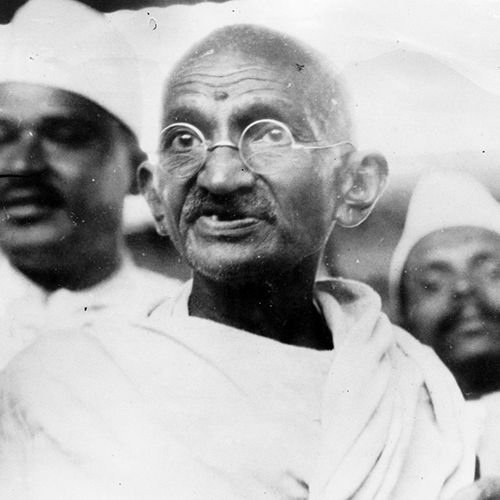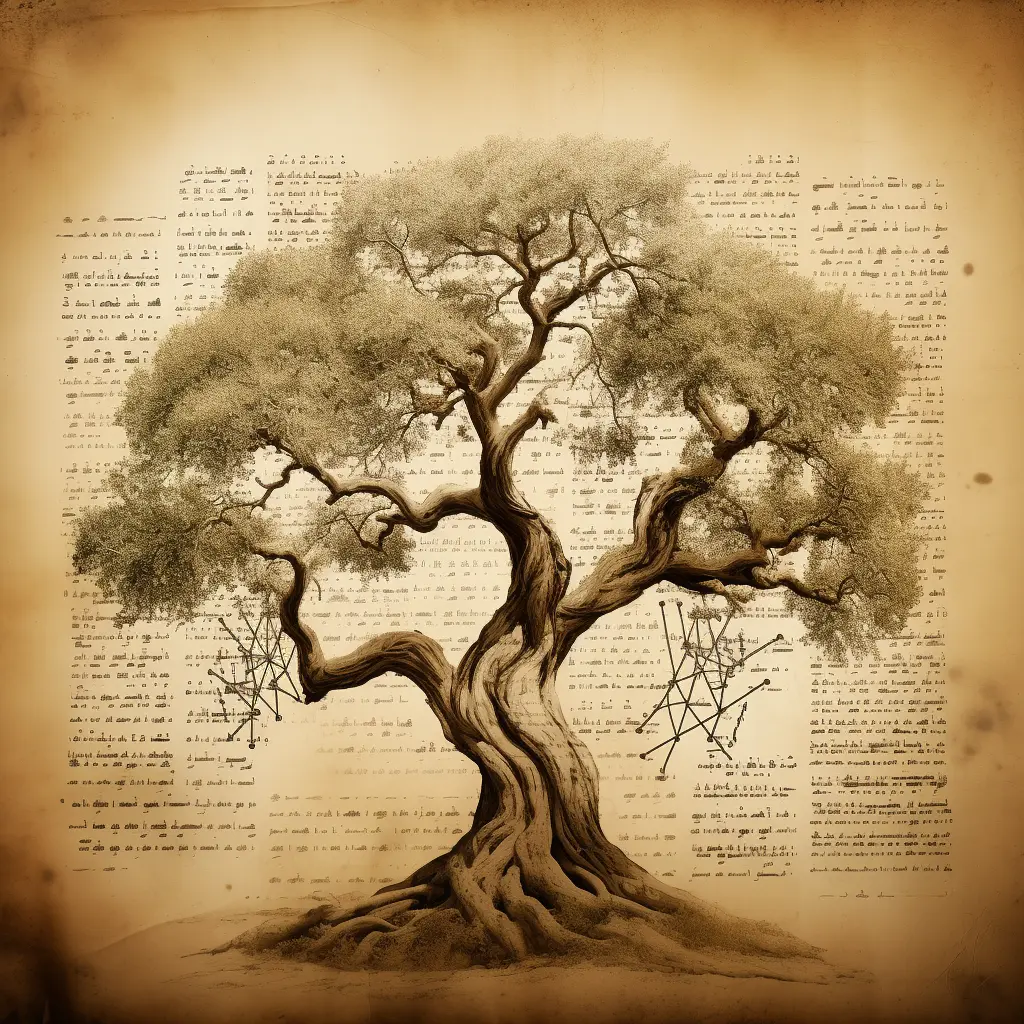
Brief Description about Mahatma Gandhi
Mahatma Gandhi, fondly dubbed the ‘Father of the Nation’ in India, was a visionary leader known globally for his principles of non-violence and truth. He was an ardent advocate for equality and rallied throngs of followers towards India’s independence from British rule through peaceful protests and civil disobedience.
Relationship of Gandhi with English Language
Gandhi’s relationship with the English language was deep and multifaceted. Initially viewed as a tool of empowerment and advancement, he utilized this global lingua franca to brilliantly voice his thoughts on freedom and equality to an international audience. Historically, many have observed Gandhi’s fascination with English literature; soaking up the gentle wisdom of Thoreau and the sharp critique of Ruskin, he wove their insights into his own philosophy. Indeed, Gandhi’s embrace of English wasn’t simply a practical choice; he saw the language as a conduit for exchanging ideas and shaping societal transformation, recognizing its inherent power to unite and inspire.
Gandhi’s Early Education
Gandhi’s Schooling in India and Exposure to English
Mahatma Gandhi’s interaction with the English language traces back to his formative years, wherein the seeds of appreciation for it were sown in his academia. Growing up in colonial India, his schooling was predominantly framed around the British curriculum. While his homeland, Gujarat, greeted him with the familiarity of native dialects, lessons in English presented a fascinating novelty.
Enthralled by the lyrical elegance of Shakespeare’s plays and the profound narratives of Dickens’s novels, Gandhi marvelled at the eloquence and refined expressiveness of English. It was not merely a linguistic accomplishment for him; it also opened windows to novel thoughts, cultures, and philosophies.
Related: What Obstacles Did Gandhi Face?
Gandhi’s Reception and Adaptation to English
In the realm of Gandhi’s early education, his relationship with English was a nuanced one. Despite initial struggles, he eventually embraced the language and the wealth of knowledge it provided access to. Gandhi saw English as a pivotal instrument for broadening his horizons. His curiosity led him to devour an array of literature, stimulating a profound love for authors such as Shakespeare and Tolstoy.
The depth and vibrancy of their prose taught him to appreciate English and recognize its quintessence. However, it wasn’t purely the literary enticement that captivated Gandhi. He found power in the language, owing to its global resonance, and he cleverly wielded it as a tool to share his ideologies on an international platform. So, the essence of Gandhi’s admiration for English was intricately tied not just to its literature but also to its capacity to connect and influence globally.
Gandhi’s Experience in England
Gandhi’s Interaction with English during his Studies in England
In young Gandhi’s life, his journey to England for law studies became a pivotal point for his interaction with English culture and language. As a voracious reader, Gandhi delved into English classics, consuming works from Shakespeare to Tolstoy, which not only amplified his language prowess but also shaped his ideology. He developed a deep-rooted appreciation for English literature, particularly for its poetic beauty and rich narratives that underscored human values. Beyond books, Gandhi’s life in England exposed him to the
Englishmen’s sense of discipline and punctuality, which he later adopted and emphasized in his own life. Moreover, his career law sharpened his appreciation for English jurisprudence and law practice. It was also this period of immersion in English culture that fostered his respect for English politeness and manly sports like rugby, even though he remained a spectator rather than a participant. Despite the confrontational politics in his life, Gandhi’s bond with the English world in his formative years was undeniable.
Impact of English Literature and Culture on Gandhi
During his formative years in England, Mahatma Gandhi developed a profound admiration for English literature and culture, which had a substantial impact on shaping his world view. He was enamored by classic English works such as Sir Edwin Arnold’s ‘The Light of Asia’ and John Ruskin’s ‘Unto This Last’, the latter profoundly influencing his socio-economic ideology. Gandhi deemed English literature so inspiring that he translated many works into Gujarati.
English culture also piqued Gandhi’s interest; he was fascinated by the English rule of law and their commitment to constitutional rights. Furthermore, Gandhi’s adherence to truth and non-violence echoes the virtues promoted by Christianity, the prominent religion in England. Although he did critique certain aspects of the culture, Gandhi’s experiences and learnings in England significantly influenced his beliefs and methodologies for India’s struggle for independence. In essence, English literature and culture cemented Gandhi’s grassroots approach, shaping him into the iconic figure revered by millions.
English as a Medium of Communication
Use of English for National and International Communication
Mahatma Gandhi held immense admiration for the English language for its potential as a tool for both national and international communication. Known for his forward-thinking, Gandhi saw English as a global vernacular bridging cultures and continents, both scholastically and diplomatically. He recognized its place in a rapidly globalizing world as a tool to voice India’s demand for independence on the international stage.
In the heart of the Indian nation, he used English to unite diverse linguistic communities and harmonize multicultural dialogues, thus weaving an intricate fabric of mutual comprehension. He also utilized English as a medium of education, believing it could empower his fellow compatriots to broaden their intellectual horizons and liberate the mind. For Gandhi, English was not just a language; it embodied a conduit of cultural exchange and a mechanism to engage with the rest of the world. His philosophy reflects a remarkable vision for the role of English in shaping a nation’s destiny.
Gandhi’s Thoughts about English as a Global Language
In the historical landscape where Mahatma Gandhi resided, he held a distinctive appreciation for English, both as an intellectual tool and a medium of global communication. He discerned the potential in the prevalent tongue of his oppressors to thwart their oppression, thereby envisioning English as a conduit to unify diverse voices. To him, English was more than an assimilation of words and grammar; it was a gateway to a broader comprehension of global affairs that transcended cultural and geographical barriers.
Confirming his fervor about English, he stated it was the ‘most effective’ language owing to ‘having become the world language’. Even as he championed the causes of indigenous languages, Gandhi embraced English with a pragmatic approach, reinforcing that proficiency in it could serve as a pivotal instrument for Indians in claiming their rightful stature in the world order. In this sense, the story of Gandhi’s connection to English reveals his visionary streak of turning perceived weaknesses into profound strengths.
Insights from Gandhi’s Writings
Influence of English Language on Gandhi’s Writings
Gandhi’s fondness for the English language emerged prominently from his engaging writings and eloquent speeches. Being educated in law at University College London, he found English to be an effective medium to articulate his thoughts and philosophy to a global audience. Acclaimed as a compelling writer, Gandhi incorporated the English language into his works in a way that resonated with diverse readers. His words were simple yet powerful, reflecting the mastery he had attained over this foreign language.
Perusing through his letters, books, and articles, one can see Gandhi’s deep understanding and appreciation of English. By adopting English while staying true to his Indian roots, he created a distinct voice that appealed to both Indians and the Western world. It is compelling to see how this language became instrumental in influencing his writings and leading the charge towards India’s freedom struggle. His writings are a fascinating testimony to the enduring impact English had on his life and legacy.
Quotes from Gandhi Reflecting his Views on English
Delving into Gandhi’s writings presents an intriguing perspective on his views towards English. “I do not want my house to be walled in on all sides and my windows to be stuffed. I want the cultures of all the lands to be blown about my house as freely as possible. But I refuse to be blown off my feet by anyone,” he mused. This quote underscores his open-mindedness towards foreign cultures and languages, including English.
He also posited that “every Indian should learn English in addition to his mother tongue and so far as possible, one or two other world languages”. This statement not only communicates his positive stance on the importance of English but also signifies his belief in multilingualism as a gateway to global understanding. Gandhi’s quotes manifest a deep-seated appreciation for English without disregarding the values held in his mother tongue and other languages.
Conclusion: The Duality of Gandhi’s Relationship with English
The Love-hate Relationship between Gandhi and English
In culmination, it’s evident that Mahatma Gandhi’s bond with the English language was no straight arrow. His exposure to English law and literature fueled his admiration for the language, which was a gateway to western philosophies that played a significant role in shaping his ideologies. He appreciated English for its richness, global reach, and instrumental role in his intellectual growth. However, this fondness was tempered by his staunch patriotism. He was pained to see his countrymen distancing themselves from their native languages in favor of English, which he perceived as a form of cultural colonization. Thus, the dance between Gandhi and English was nuanced and rich with complexities.
Significance of Gandhi’s Engagement with English in Current Scenario
In wrapping up, despite Gandhi’s initial adversities with English, his ultimately complex relationship with the language holds significant relevance today. English, seen by Gandhi himself as a means to wisdom, enabled him to convey his principles of non-violence and freedom across borders. This led to an extensive reach, engaging a multitude of people in his vision and cause. Simultaneously, English served as a tool to bridge cultural differences and unite diverse population groups within India. Hence, it clearly underscores the paradox that Gandhi’s interaction with English language puts forth—a tool he questioned yet essential for his global outreach. The lesson is that some tools, though foreign, can be pivotal in accomplishing our meaningful pursuits.



